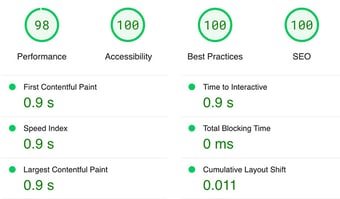AI search: how to optimize your website (and hot takes from INBOUND25)
The last few years at HubSpot’s annual INBOUND conference have been “all about AI.” This year? Inbound 2025 was less hype and more real-life...
Take full advantage of the new and improved HubSpot CMS experience with the CLEAN theme.
Have a question and looking for an answer? I've likely got a video for that or an article that covers it.
Google PageSpeed Insights is the gold standard in analyzing the speed and performance of a website. Here is how CLEAN Pro ranks. Not too shabby for a media-rich page.

Report generated: Tues, March 7, 2023, based on Home Page - Opt 1.
5 min read
 Miriam-Rose LeDuc
:
November 14, 2025
Miriam-Rose LeDuc
:
November 14, 2025

Marketers and business owners like you are asking: how can I get more eyeballs on my product or service in this new age of AI? What is Answer Engine Optimization (AEO), and how will I know if my hard work is paying off?
If you’re wondering about the future of website traffic for your business and how to get cited in LLM results, you’re in good company. And the answer is super easy. Here’s what you do:
Ready, set...go!

Just kidding, we’ll break it down. Hang with me and I’ll walk you through the details.
So how do you define AEO success? So glad you asked. For ages, marketers optimized for website traffic, and while your website is still the threshold of your business, traffic alone isn’t your main KPI anymore unless you want to be depressed (you probably don’t).
While traffic is plummeting, the good news is that the people landing on your site are better qualified and have more purchase intent, so conversions are actually going up. What a time to be alive. So here are a few metrics you could track for AEO:
Pick one or two and decide what matters to your business.
But before you can see AEO trends over time, you’ve got to take a baseline measurement.
You won’t be able to see how far you’ve come if you don’t take a second to see where you are. Mark the start line, then you’re off to the races.
Thankfully for HubSpot users, there are plenty of built-in data points to help you get started.
But is SEO dead? Well, that’s up for debate. There are plenty of SEO best practices that still help marketers track and gain visibility in the age of AI.
In your HubSpot account, go to Content -→ SEO -→ SEO Analytics to connect to Google Search Console if you haven’t already (here’s a step-by-step). This tab will still give you insight into how your pages are ranking, where they appear in SERPs, how many clicks they get, etc.
AI is more likely to surface content and sources that already perform well for humans, so even if though we’re not looking at AI referral data yet (we’ll get there), this data is still correlated to overall brand recognition across traditional and AI platforms.
Time to get nerdy and build reports! Both the individual page tab and custom reports let you get granular with some of the new AI referral source properties in HubSpot. We'll look at an example for traffic coming directly from ChatGPT. Here’s what you can see and how to build it.
Go to your custom report builder, create a new custom report from scratch, then use Web Activities as the primary data source.

Choose a line graph, use timestamp as your Y axis, page view count as your X axis, and break down by page title.

Then choose your date range and add a filter for UTM source to include “gpt”.

Save your new report to any dashboard you like, and now you can see your AI referrals by page trending over time. Woohoo!
Since AI referral data is new in HubSpot, we’re just scratching the surface of how to gather and interpret it. But if we don’t start measuring it now, we won’t have the trends to prove your AEO efforts are paying off.
This step can be somewhat tedious, but if you have a blog post or topic you want to be known for, asking an LLM and seeing what sources it cites will tell you what brands are currently authorities on the topic (hopefully you).
For example, I asked ChatGPT: “What are the best tools for HubSpot marketers to quickly and easily add schema markup to their website pages?” And it spat this out:

I see SuperSchema in the top 3, so it’s awesome we’re being cited (shameless plug). Perhaps if we apply the steps listed here, we’ll eventually take the number one spot. :)
HubSpot's AEO grader is a great tool for analyzing overall brand sentiment and mentions, but it doesn't give you much granularity. Use it as a high-level baseline, and measure again in a couple of months to get a sense for how your brand sentiment trends over time.

Finally, the fun part: how to make your website as irresistible to AI as dad jokes are to nerds: structured, semantic, and impossible for large language models to ignore.
Schema markup is code that goes into the header of your website page and tells AI how to “read”, parse, and find relevant information in your content.
While schema might not sound sexy, without it, LLMs won’t know how to retrieve the right information and will move on to another source (like when you forget to put your keys where they belong and start checking the couch cushions).

There are a few ways to add this type of structured data to your website: hire a developer to go through page by page, use HubSpot's blog structured data (beta), or use a tool like SuperSchema. With the giant gap between what marketers need for successful AEO and what we're technically capable of (especially on a budget), I'd highly recommend SuperSchema for the most bang for your buck.
Tools like SuperSchema integrate directly with HubSpot, making this super easy for marketers like you. Could you create the schema yourself (with ChatGPT)? Of course, you could. Do you have time? I think you’d rather be spending it on other things. Enjoy getting a few minutes of your day back, you’re welcome.
Pro tip: if you're using any schema generator outside of HubSpot, check your blog settings and make sure your structured data toggle is OFF. You don't want HubSpot's beta schema interfering with SuperSchema (which is honestly way higher quality, sorry HubSpot).

Let’s be a little more specific, shall we?
Marketers should use semantically complete copy with a clear subject, predicate, and object.
For instance [semantic triples in brackets for reference]:
"[SuperSchema] [offers] an [AEO tool] that supports instant website page optimization."
Here’s a handy custom GPT marketers can use to score and edit content on semantic completeness. Have at it (and have fun). :)
Even small tweaks like rewriting an outdated event page in the past tense or adding the current year to an evergreen article are like Febreze for your content. Keep things fresh and see if AI includes you in more citations (just please don’t be a garbage person and update your content with fake info for AI referrals; it’s misleading to your human readers and won’t do anything for brand trust and loyalty in the long run).
Now that you have your baseline and metrics in place, you’re in a strong position to iterate over time.
Set a calendar reminder for a month or two from now and measure your AEO grade again (see Step 2). Do you notice any changes?
You’re doing great. All of us marketers are figuring out AEO together.
Want to make it easier on yourself in the meantime? Try SuperSchema (first two credits are free) to get AI-optimized pages without the technical headaches.
You got this.

To gain AI visibility, define your metrics, build your baseline in HubSpot, structure your data, and check back monthly.
And, SuperSchema makes it easier (and more fun).

The last few years at HubSpot’s annual INBOUND conference have been “all about AI.” This year? Inbound 2025 was less hype and more real-life...

As we all know, the Google Gods tend to favor light, fast pages when serving up search results. In this post, I'm going to break down my top 5 web...

In a sea of SEO advice, it can be tricky to know which tips are worth trying. But you’re about to learn one little typography trick that you won’t...